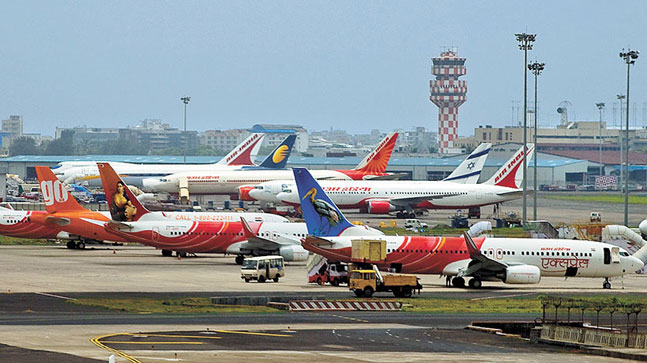Articles

Kochi Public Transport Day on Monday
January 12, 2019
Public Transport Day observed in Kochi
January 15, 2019Indian Aviation Scene: Empty Seats and Empty Pockets

Image Courtesy: Business World
The Indian aviation industry is touted to be one among the fastest growing industries in the world. The international aviation market has grown significantly with 54 million passengers carried to and from India by both domestic and foreign carriers in 2016–17. This marks an increase of approximately 10 per cent from the previous financial year. During the same year, Indian carriers increased their passenger traffic by 13 per cent compared to 8-per-cent growth for foreign carriers. The Centre for Asia Pacific Aviation (CAPA), a specialised aviation consultancy, estimates the Indian aviation market to be the third largest market by 2020 and the largest by 2030.
In accordance with the norms set in the Chicago Convention on International Civil Aviation, countries enter into agreements giving each other the rights to operate air services. India has signed over 100 such Bilateral Air Service Agreements (BASA). The BASAs have different provisions that describe the terms of operations, viz. traffic rights clauses, capacity clauses, and ownership/control clauses. One of the main components of any BASA is the seat sharing policy, which limits the capacity that the carriers can operate by imposing a cap on the number of seats offered. These traffic rights are based on principles of reciprocity, wherein both countries have the same capacity entitlements. The outcomes of these policy negotiations have great bearing on both the airline operators and the average Indian flyer, as they directly influence the supply of seats in a particular sector and the pricing of the same.
With the rising standards of living and economic growth in the country, the demand for air services has risen significantly. Without a favourable policy framework, the Indian aviation sector will be ill-equipped to take advantage of the opportunities in the market. Despite increased passenger traffic, Indian carriers are saddled with mounting debt and escalating losses. A closer look at the passenger traffic reveals that foreign carriers service a significant share of international air traffic. In 2016–17, 62 per cent of the total international passengers to and from India used foreign carriers[1].
One of the factors influencing the Indian carriers is the protectionist policies adopted by the government towards Air India Limited (AIL). This has denied private Indian carriers a level-playing field, especially during allocation of traffic rights. This could significantly hamper growth, especially for countries like India with increasing income levels and a large emigrant population.
As per the World Migration Report (2018), India was the largest country of origin for international migrants in 2015 with over 15 million migrants abroad. The largest migration corridor originating in Asia is the India–United Arab Emirates (UAE) corridor and the civil aviation capacity deployed in this sector is of critical importance. India has separate bilateral agreements with the emirates viz. Dubai (65,200), Abu Dhabi (50,000), Sharjah (17,841) and Ras Al Khaimah (1400)[2]. Despite equal capacity entitlements, UAE carriers deploy more seats in the sector compared to Indian carriers. During 2016–17, UAE carriers[3] deployed more than 10 million seats (passengers to and from India), while Indian carriers[4] transported only close to 8 million passengers to and from India[5]. The underutilisation of quotas is a serious concern as it creates a demand-supply mismatch and drives up ticket prices for the passengers. While designated airlines are fully utilising the capacity in certain countries, viz. Dubai, Indian carriers generally have a lower utilisation capacity than their UAE counterparts. Despite discussions on increasing the entitlements, they remain unchanged due to the objections raised by the Indian carriers claiming a detrimental impact on their own international operations. Carriers such as Emirates and Etihad carry a large share of the sixth-freedom traffic[6], and increasing flying rights, domestic carriers claim, would eat into the revenue from their international operations.
Any move towards curbing flying rights would be against the better interests of the consumer and lead to increased airfares. Such a move would also stifle the growth of the aviation sector, as it would disadvantage newcomers like Vistara that hope to begin international operations but have no flying rights available. The Centre has been unwilling to approve trading in seat capacity; however, considering the poor financial state of the aviation sector the government should seriously review its policy. Freely allowing trading between carriers, both foreign and domestic, would optimise usage of capacity entitlements and increase utilisation from the existing 30–40 per cent. It could also delay the need for increasing overall entitlements in the sector.
The unfair advantages endowed to the state carrier are also a cause for concern. The policy of promoting and protecting the state carrier is largely owing to the evaluation of a country’s performance in the aviation sector based on the performance of its state carrier. The adoption of such a protectionist policy upsets free and fair competition in the market. To that end, the process of allotment of flying rights to domestic carriers must be more transparent in nature without any special considerations to AIL. A freer and more liberalised aviation industry would provide an impetus for the sector to grow exponentially, giving more choices to the consumers and increasing competition between domestic and foreign carriers.
Chithira Rajeevan is Research Assistant with the CPPR Centre for Comparative Studies. She can be contacted at [email protected]
[1]DGCA Air Traffic Statistic 2016-17
[2]Numbers within parentheses are seats per week in each direction
[3]Air Arabia, Emirates, Etihad Airways and Flydubai
[4]Air India, Air India Express, Jet Airways, IndiGo and SpiceJet
[5]DGCA Air Traffic Statistic 2016-17
[6]The right to transport traffic from one State (India) to another (Country B) via the home State of the carrier (UAE)
Chithira Rajeevan was Research Assistant at the CPPR Centre for Comparative Studies and she has a BSc in Economics from Symbiosis International University.

